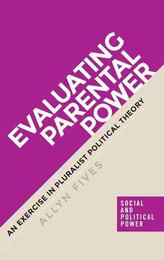
|
Evaluating Parental Power: An Exercise in Pluralist Political Theory
Hardback
Main Details
| Title |
Evaluating Parental Power: An Exercise in Pluralist Political Theory
|
| Authors and Contributors |
By (author) Allyn Fives
|
| Series | Social and Political Power |
|---|
| Physical Properties |
| Format:Hardback | | Pages:288 | | Dimensions(mm): Height 234,Width 156 |
|
| Category/Genre | Ethics and moral philosophy |
|---|
| ISBN/Barcode |
9781784994327
|
| Classifications | Dewey:173 |
|---|
| Audience | | Undergraduate | | Professional & Vocational | | Postgraduate, Research & Scholarly | |
|---|
| Illustrations |
2 charts
|
|
Publishing Details |
| Publisher |
Manchester University Press
|
| Imprint |
Manchester University Press
|
| Publication Date |
21 June 2017 |
| Publication Country |
United Kingdom
|
Description
Is parents' power over their children legitimate? And what role does theoretical analysis play when we make such normative evaluations? While this book adds to the growing literature on parents, children, families, and the state, it does so by focusing on one issue, the legitimacy of parents' power. It also takes seriously the challenge posed by moral pluralism, and considers the role of both theoretical rationality and practical judgement in resolving moral dilemmas associated with parental power. The primary intended market for this book is advanced undergraduate and postgraduate students and established academics, in particular those with an interest in practical and applied ethics, contemporary political theory, moral theory, social theory, the sociology of childhood, political sociology, social work, and social policy. -- .
Author Biography
Allyn Fives is Lecturer in the School of Political Science and Sociology and the UNESCO Child and Family Research Centre, National University of Ireland, Galway -- .
Reviews'Fives' book is a wise, intelligent, consistently interesting, robustly argued and elegant discussion of issues that span the division of normative applied philosophy into ethics and political theory. It is an excellent contribution to the Lockean question of how and why power is rightly exercised by adult guardians over their children. No-one can read it without understanding this question better.' David Archard, Queen's University, Belfast, Journal of political power -- .
|